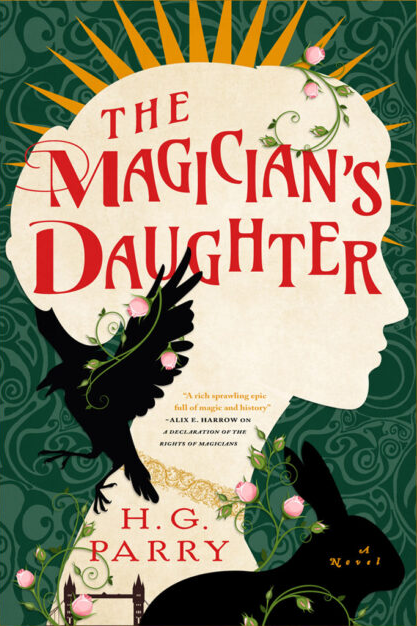It’s been a while since I’ve read something so thoroughly satisfying as The Magician’s Daughter. H. G. Parry’s book is a wonderfully atmospheric urban fantasy with a cast of characters clearly crafted with love, making them fun to spend time with. Themes of social and political change give weight to the story, but Parry’s balanced approach means that they never get in the way of the plot, keeping it a cozy armchair read.

Seventeen-year-old Biddy has never known anything outside the enchanted island she grew up on, where she was raised by her mage guardian Rowan and his rabbit familiar. Biddy herself is not magical and wishes for independence, so she longs to see the world of other ordinary people. When one of Rowan’s frequent trips to the mainland goes wrong, Biddy learns of his mission. Magic is a physical resource that can be harvested and used by people with an affinity for it, or it can be left to act positively in whatever way it wishes. But magic is increasingly scarce outside Biddy’s island, and what remains is being hoarded by the miserly Council of Mages, so Rowan steals it and gives it to those in need of a miracle. Biddy’s wish to see the wider world comes true when her island home is threatened. Travelling to London, she takes part in a plan to wrest magic from the Council’s grip and save it from disappearing completely.
There’s a lot going on here. Magic is scarce, it turns out, because the mages are using it up too quickly. This finite resource overconsumption has real consequences: now, due to the greed of a few, there is no more magic to improve the lives of ordinary people. The book also discusses prejudice, poverty, and the correct approach to systemic change. Parry’s light touch makes it all work without succumbing to preachiness or too-transparent allegory. I can easily imagine some anachronous nod to current events being slipped into the Edwardian world of the story, but thankfully this isn’t the case.
Part of the reason why The Magician’s Daughter avoids a preachy tone is that none of these themes have too central a focus. Above all, this is a coming-of-age story about a girl waking up from her naive childhood and sheltered existence. In London, Biddy witnesses poverty in the streets, neglect at an orphanage for young girls, and cruelty from established mages. She’s challenged with facing this ugliness and trying to change it. In the process, she also has her illusions about the perfection of her parental figure shattered—a part of growing up that we don’t often get to read about. Her struggle with Rowan’s complexity follows a convincing arc and is extremely endearing.
Of course, there would be no struggle if Rowan wasn’t a complex character in the first place. Luckily, all the characters possess depth as individuals and interact with each other in realistic ways. Parry avoids one-note characterization: the flippant, charming Rowan is equally capable of nastiness and sincerity, and his ex-fiancée and Council member Mograine acts ambiguously enough that her intentions remain in doubt. Even the secondary villain, Storm, is fleshed out. His perspective is given time and thought, maybe even too much, since we are sometimes called upon to sympathize with him in the middle of a conflict. Inopportune timing aside, these insights manage to make Storm compelling in his own right.
Many’s the time I have picked up a recent publication that claimed to do as much as this book does. The blurb and general hype will lead me to believe that the book I’m holding has as interesting a premise, sets as much store by its characters, and involves as many topical discussions of politics and social issues as Parry’s book, only for things to go sideways a few pages in. It’s always a discouraging experience that makes me feel like magic is disappearing from our real world. I’m glad I avoided it with The Magician’s Daughter, and we are lucky to have a reliable wellspring of magic in H. G. Parry.
